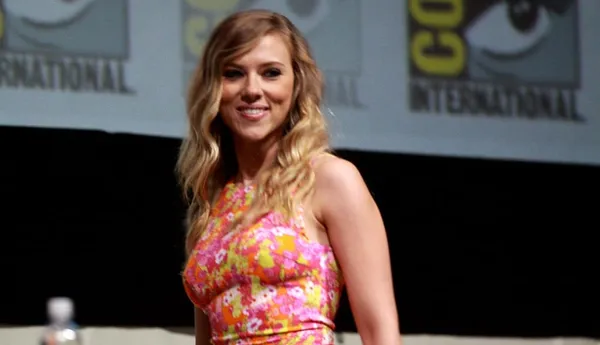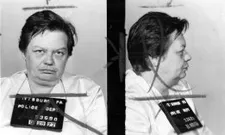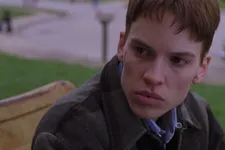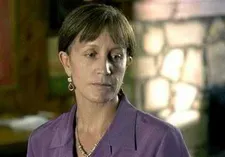 |
| Scarlett Johansson, controversially cast in Rug & Tug Photo: Gage Skidmore |
What is the point of authenticity?
Following the cries of derision at Eddie Redmayne’s ‘transface’ for The Danish Girl and her own boycotting for playing a canonically Asian character in Ghost In The Shell, the perfect-pouting Scarlett Johansson has courted controversy again for her casting choices. She has signed up with Ghost In The Shell director Rupert Sands to play real-life transgender man Dante ‘Tex’ Gill in Rub & Tug. Tex ran massage parlours (the location of the ‘rub and tug’ of the title) and a steroid racket, and had a little sex worker operation on the side to keep things ticking over. People have predictably complained that Scarlett’s casting constitutes misrepresentation, but on exactly why it might, they are perhaps missing the point.
 |
| Police mugshots of Dante Gill |
What do we want? Representation! When do we want it? Now!
Why do we want it? Uhh?
Movies are about telling stories. They tell us about the world we have and haven’t seen and the way their stories progress often have an implicit moral code about how we (yep, identify as you will) should be treated. Representation shows that different types of people exist and how we should all react to each other – it’s telling that even outlets like The Sun foregrounded its coverage of Black Panther not by talking about the film itself, but that its constituted a cultural moment showing black people could be heroes. Representation in entertainment challenges discrimination by telling people about difference without becoming brow-beating. It can make it easier for us to live together, as was shown by Dallas Buyers’ Club. It also means more interesting films can be produced because there are topics to cover that haven’t been presented a million times before. It is good for industry.
Authenticity vs Efficacy
An unfortunate side effect of representation, however, is that we can conflate authenticity with efficacy. We can assume that because we know a character is played by a person from a particular background, they have experienced some of the same things. That does not mean that they did experience the same things or indeed reacted to them in the same way. To those of us invested in seeing these characters represented because of who they are rather than the story in which they are involved, this can mean we (in an almost mental-financial transaction) give extra praise because we take the characters as ciphers for ourselves. It’s sometimes kind of assumed not to matter if the character is not a direct representation of the individual because they’re almost not meant to be. I suggest this is why CNN cites non-binary actor Ellie Desautels as more appropriate for the role – it’s pure politics. They are transformed into the political symbolic us because that gives them cross-cultural power. To me, however, that’s not a biography – that’s a documentary without the glamour or the ego trip.
 |
| Hilary Swank in Boys Don't Cry |
Trans man Brandon Teena, represented by Hillary Swank in Kimberly Peirce’s Academy-Award winning Boys Don’t Cry is a good example of icon ascendance – the trailer (with that silky-smooth, Hollywood guy voice) told us that the film was about ‘the courage is takes to be yourself’. It worked, and works for me because I utterly identified with that so-excited-it-hurts-but-trying-to-be-cool, cowboy grin when Brandon goes into the skating rink for the first time. That Brandon lied to those closest to him and stole stuff to make girls like him? I totally get it – you make do with what with you have and Brandon enjoyed being a chancer – taking risks is a kick. I strongly suspect people would consider that ‘problematic’ or try to validate it by saying he was doing it purely as a result of oppression (I doubt it). His iconicity is what matters to most folks.
Authenticity becomes more awkward when we think about what’s being represented. Swank is not trans, but she became Brandon. She chopped her hair off, altered her physique, bound her breasts and presented herself as a relative to get real life experience. She lied to director Kimberley Pierce about coming from Nebraska (like Brandon) to ease the fit, reasoning it’s what Brandon would have done. It goes without saying that the story is otherwise how he saw himself.
Scarlett Johansson as Tex in the proposed film is another issue entirely. It’s not because Scarlett doesn’t identify as anything other than heterosexual and gender normative (as though some vague fudging of queer would be okay) either. It’s because early word suggests the film will change the character of Tex from a trans man to a butch lesbian. This would not be so much of an issue if Tex had seen himself as butch because trans identities were not as well known then, but that’s not the case. To change Tex’s identity and the sheer determination it takes to live as who you are, especially if you’re in a society that insists on misgendering you constantly, takes unbelievable nerve, especially if you’re not insulating yourself with wokeness. It’s erasure not just because it’s altering one person’s story, but because it is pretending that that story didn’t happen and that it isn’t possible to live successfully outside a cookie cutter narrative. There is not one type of trans person. I repeat: there is not one type of trans person. Our gender identities and expressions may indeed say jack shit about our politics or which artist we’ll have on Spotify. Tex showed that. Okay, he eventually went to prison, but dammit he made a life for himself living the way he pleased and largely to hell with anyone’s rules about how that should be.
 |
| Felicity Huffman in TransAmerica |
Celebtivists
A little honesty also doesn’t go amiss. There’s a world of difference between saying we want people to know that we exist and a few celebtivists demanding personal access to a casting agent because they want to be movie stars. To get mainstream appeal may have to mean hiring a bankable, capable name and there’s probably one heck of a lot less people identifying specifically as trans men than there are folks with Chinese backgrounds, after all. Felicity Huffman brought a Desperate Housewives audience to TransAmerica. Jeffrey Tambor made Transparent sympathetic household conversation. Some of our classic films – from Oscar Winners Dog Day Afternoon to The Silence Of The Lambs - showed trans women as criminals and serial killers. To pour scorn on the attempt at representation because it isn’t your name in lights runs the risk of being both selfish and self-defeating.
A further knot in the cinema ticket is the relativism of cultural representation. The internet in all its glory has been on the planet for the equivalent of millionth of a hiccup. In that time, everything from #blacklivesmatter to #bopo (do you know both?) is beginning to change the way we see ourselves and react to each other. Change takes time. Stories about different people are coming out and with them more people are coming out. If the end goal is to give further voices to people to encourage more people to live authentically (noting the assumption of greater numbers) then proliferation can only help the cause.
Part of the joy of watching films is being able to witness transformation. This is less the physical kind as opposed to the actors’ ability to expand our own horizons by showing us things that may be outside of our experience. It is for this talent - a skill - that people such as Dame Judy Dench were rewarded for that blink-and-you miss it screen time in Shakespeare In Love. We admire it on an intellectual level, but importantly it is also very persuasive. Caring about an issue doesn’t make you more entitled to be paid to talk about it over someone else who can present it more effectively.
 |
| Scarlett Johannson in Ghost In The Shell |
One thing people tend to forget within academic and cultural circles is that social media - and indeed society - increasingly enables us to live in a bubble where we can choose who we will associate with and to which views we will be exposed. While we may choose not to view certain content that we may find upsetting, not viewing that content also means we can become less aware of the views and opinions it reflects. We can lose track of how other people really think. In the context of trans issues, this can sometimes be interpreted as aggression by the mainstream whereas it can actually be a case of misunderstanding. What’s more, we can sometimes throw up our hands in anger as people make yet more casting decisions we disagree with and we will yell that they should educate themselves. Sometimes people are trying but don’t yet have the skill/time/patience to understand dense academic texts, simply don’t agree with us (and therefore don’t connect our ire to inevitable wider narratives on hegemony and the way the world needs to change) or simply don’t know these other narratives exist. We must be careful not to assume that representations that we don’t agree with are placed there as an aggressive act to spite us.
Let Scarlett play Tex. Changing the character from the gutsy trans man he was to a butch lesbian is very far from ideal, but is it better that some diversity is shown than none at all. That gets none of us anywhere. The true spirit of a trans pioneer will be carried through a million blogs until the rest of the world catches up. This isn’t about you or me or arguably even about the real historical Tex, but about bucking the rules and sharing the story of someone who succeeded. That will eventually lead to change.





















